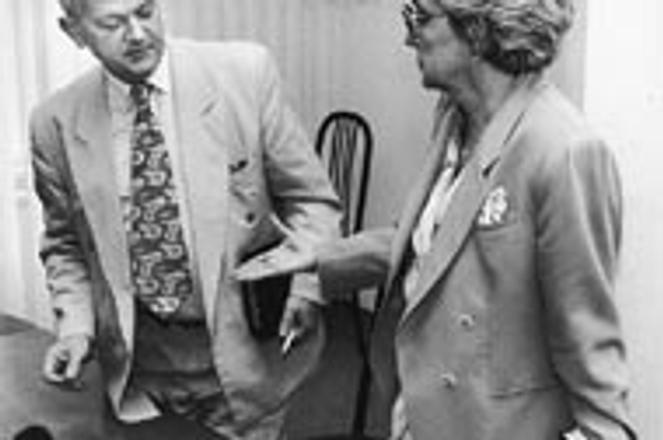Social Affairs Minister Oľga Keltošová (right)and DU MP Roman Kováč shake hands.Vladimír Martinka
When Prime Minister Vladimír Mečiar declared on June 20 that his ruling coalition was "not functional" and hinted that he would not protest against having early elections, opposition politicians said no way.
That's because they think that if elections were held in the next few months, Mečiar would capitalize on his currently huge popularity with the Slovak electorate to steamroll those parties opposed to his Movement for a Democratic Slovakia (HZDS).
According to Róbert Fico, deputy chairman of the Party of the Democratic Left (SDĽ), if Mečiar "makes himself a martyr for the third time" and manages to trigger early elections, his party's popularity, currently at 35 percent, could increase another 10 points. "We will not let him go," said Roman Kováč from the opposition Democratic Union (DU). Kováč, a former Mečiar ally, was among those who defected from HZDS in March 1994 and later supported a no-confidence vote against Mečiar's Cabinet that caused his government to collapse.
Adored by approximately one-third of all Slovaks, Mečiar is strongly disliked by an almost equal amount of Slovak citizens. Emotions over Mečiar have broken friendships and caused disputes among relatives.
When Mečiar was removed as prime minister of the Slovak coalition government under federal Czechoslovakia in 1991, many people felt hurt and refused to accept the widespread reasoning that he had been blackmailing political partners.
Then, in June 1992, HZDS's sweeping election victory secured it 74 of 150 seats in Parliament and the position of prime minister for Mečiar. It was early during this second term in office that Mečiar pushed for Slovak independence, which became a reality on January 1, 1993.
In 1993, he recruited the Slovak National Party (SNS) and its 15 seats into a coalition. But disagreement between Mečiar and SNS leadership later split the SNS and its parliamentary club. This club was later joined by eleven defectors from HZDS who said Mečiar was autocratic.
In March 1994, President Michal Kováč gave a highly critical speech in Parliament, in which among other things, he accused Mečiar of abusing privatization to secure money for HZDS. Parliament voted Mečiar out of office again, and agreed to hold early elections six months later.
HZDS won those elections by a landslide, gaining 35 percent of the vote and emerging with 61 seats in Parliament. The runner-up, a coalition headed by the Party of the Democratic Left (SDĽ) won just 10 percent and finished with 18 seats in the national council.
Having hoped for a larger majority, Mečiar first did not want to be the prime minister, but eventually struck a deal with SNS and the Association of Slovak Workers (ZRS) to get a majority in Parliament and to ensure that no opposition deputy could become a chairman of a parliamentary committee or a member of those institutions watching over privatization, television or the intelligence service.
Opposition politicians claim Mečiar and his populist HZDS cause tension in the population and impede Slovakia's democratic development. They do not hide the fact that they would love to see Mečiar go and never come back, but for now are unwilling to form an anti-Mečiar bloc for the next elections, slated for 1998. Instead, they want to wait for Mečiar's voters to change their minds after they see him rule for a full term. "We are interested in having this government serve the full term of office," said SDĽ's Fico. "We then will ask them some unpleasant questions."
"We do not want early elections, no way," said Peter Weiss, Fico's party colleague. "We want Mečiar himself to increase the electricity prices and [make] all the other unpopular moves. Let him do it and suffer for it."

